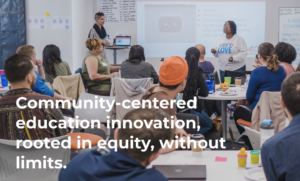The Shadow Education System

- Image via CrunchBase
Entrepreneurs are working very hard to build education systems outside of the formal higher ed and public ed systems. One day, they will merge with the increasingly archaic structures of public ed, but for now, they will remain outside.
Is it possible that companies like this will form partnerships with Knewton.com or Facebook? University of Phoenix made $3.7 billion in 2009 [the source I used this morning was off by just a bit, this page says that the University of Phoenix made $3.9 billion in revenue, and a net income of US$598 million. The entire Apollo Group’s revenue was $5 billion. Hat tip to Tom Vander Ark for the specifics and the links.], and that was during a recession. Facebook’s revenue was only, ONLY, $800 million. Can you imagine what happens when Facebook puts a learning curriculum into its platform? Could they make more money than University of Phoenix? Could they offer a more adaptive and successful learning system than Duke University? If you think that knowledge and skills needed usually need to be utilized in the shorter term, then maybe. Maybe. If we truly live in a knowledge economy, then it will be our social value online that measures our ability to rise first to a challenge, be the first to be relied upon to fix the problem, and it will have less to do with our degree, than with how we treated someone in our day to day life.
That’s why relationships are so important. That’s why online and working out in the open is so important. You can exchange knowledge with strangers, send them contact lists, and if you don’t use other people’s knowledge for selfish benefit, and include people in your circle, then you will increase your social value among others.
The worst thing to do in the new social media education system? Using other people’s skills, stealing their ideas, or “not playing well with others,” so to speak. You will be ostracized, and it won’t matter if you went to Harvard, Yale, Duke, or Pembroke College. Your education, your future, and your reputation are in the hands of others.
I sat next to GOOD Magazine editor Amanda Fairbanks at this morning’s SoHo “The Feast” event. It was about the nexus of education system improvement and education-themed technologies. Startl founder Diana Rhoten was there, being interviewed by Fairbanks. One of her many important points was that education’s market, if it can be called a market, is that there is a paucity of supply of good tech, smart entrepreneurs, or talent in the space. If you are looking for someone who can create a disruptive technology, software, or design, you are going to look high and low for a long time.
She warned of a second problem. “This may sound counter-intuitive,” said Rosen, but she thought that there was too much money flowing into education. “I managed an $18 million fund, and I could not spend it all [in education].” Made me wonder where the money is coming from, and where it is going. She mentioned without naming two investment funds that are set to announce huge education funds, which they will dedicate to systems improvement and technology. One of them is set to announce today. Both are located in New York.
Then Michael Karnjanaprakorn announced the startup of his company, Skillshare.com. The point here is that you can learn anything from anyone. Why? Karnjanaprakorn believes that “we have to debunk the myth that we need a college degree to be successful.”
He’s going where StraighterLine and University of the People have gone, disrupting the higher education, degree-granting model, by offering a platform that can be used for free, and that he hopes over time will mean the learning of skills, trades, and techniques that can provide you with a living, without ever having a degree. They are making the platform free. They’ll exchange adaptive data with platforms like Knewton.com (that’s the hope), and the community, not a cohort, will be the better for it.
And that’s when the penny dropped (well, it dropped a long time ago, but Michael is the first one I’ve met in person). This is the Shadow Education System. It’s the education that will happen regardless of the local model.
Take a look at the Skillshare.com animation video about the college degree crisis.
Take a look at Karnjanaprakorn’s manifesto:
“Learning is not a product of schooling but the lifelong attempt to acquire it.” -Albert Einstein
Skillshare is a platform to learn anything, from anyone. Our mission is to flip the traditional notion of education on its head and revolutionize learning. We are challenging the assumption that learning only occurs within the four walls of a classroom. Instead, we’ll tap into existing communities and networks, which we believe are the world’s largest universities.
What We Believe
- Everyone is a teacher, and everyone has valuable knowledge to share.
- Everyone has a lifelong right to enjoy learning new things.
- Learning should happen in communities.
- Learning should not stop when you graduate from school.
Related articles
- What’s Happening in America’s Public Education System? (prweb.com)
- Causes of Poverty (socyberty.com)
- 5 Ways Tech Startups Can Disrupt the Education System (currentbuzz.org)
- Education System in Pakistan Need Improvements (socyberty.com)
- Education Administrator (superscholar.org)
- Colleges of Education warn FG against scrapping (vanguardngr.com)
- Schools ‘overloaded’ by curriculum reforms, says exam chief (telegraph.co.uk)






Chris Lindsay
Douglas,
I agree with you that the shadow education system is in full effect and is poised to disrupt higher ed in general. I'm an older student (28), close to graduating now but I took almost a decade off in between H.S. & college. During this time my passion for learning never ceased, and I used open courseware and online lectures/resources to continue learning. There are so many options besides the traditional university model.
Universities are where newspapers were in 2000, and where the music biz was in '94 - about to be massively disrupted and have their inefficiencies exposed. people/processes/systems who can educate students the best are going to win, and without the infrastructure & overhead of the uni they will do it orders of magnititude cheaper.
The problem is credentials. Kahn Academy doesn't grant degrees, I can't export the proficiencies I have gained via OCW. An alternate credential to the B.A./B.S. is absolutely necessary to widespread adoption of shadow education. The revenue stream of for-profit degree granting Co's like University of Phoenix is almost exclusively from federal student loans (& some pell grants). Unless the "shadow" education system gets certified by ACE or comes up with their own, respected by business credential it will remain in the shadows.
I think your definition of shadow education as "the education that will happen regardless of the local model" is absolutely right. For the vast majority of students, this model is something they don't care about and will never take advantage of unless there is something in it for them. And for most students, that something is a degree that validates them in the eyes of the H.R. person hiring them.
Chris Lindsay
Student Body Vice President, University of Colorado Denver
Replies
Douglas Crets
Chris,
I think it's so interesting you bring up the media and music businesses as parallels to the current education situation. I think you are right on about credentials. Diana Rhoten was telling a meeting of younger entrepreneurs the other day that all we needed to do is just make great companies, like Knewton.com, and then the education administration would understand us and change would happen. Really don't think it's that easy. These are political levers, and political systems that are solid and entrenched. There are generations of thinking put into keeping education the way it is.
Chris Lindsay
have you seen this? http://universityofreddit.com/
I will be interested to see how it takes shape. Also what will the demographics of users? I wouldn't bet on a ton in the under 25 range but I could be wrong.